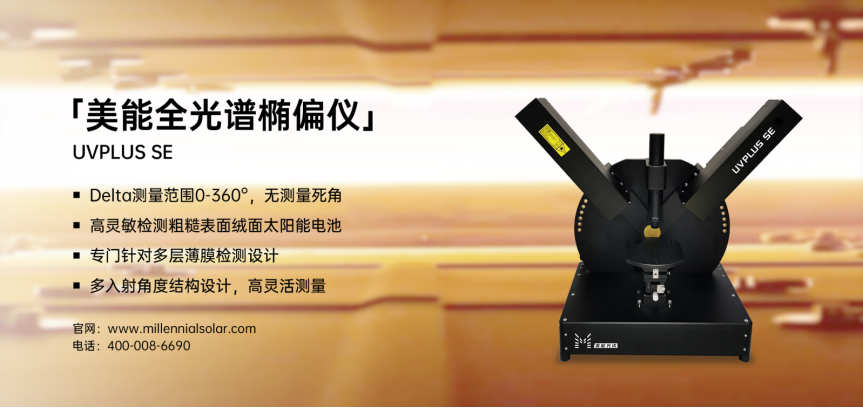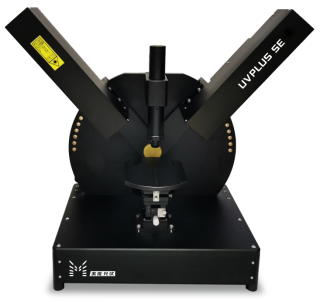
量子效率测试仪
PL/EL一体机
Sinton硅片少子寿命测试仪
Sinton硅块少子寿命测试仪
绒面反射率测试仪
3D共聚焦显微镜
在线四探针方阻测试仪
全自动扫描四探针方阻测试仪
在线薄膜厚度测试仪
晶化率测试仪
Horiba显微共焦拉曼光谱仪
傅里叶红外光谱仪
霍尔效应测试仪
分光光度计
全光谱椭偏仪
Horiba椭圆偏振光谱仪
TLM接触电阻率测试仪
超景深显微镜
网版智能影像测量仪
全自动影像测量仪
卧式拉力机
电池片稳态光衰老化试验箱
电池片紫外老化试验箱
电池片拉脱力综合测试仪
外观检验台
湿漏电测试系统
组件实验室EL测试仪
紫外老化试验箱
稳态光衰老化试验箱
电流连续性监测系统
PID测试系统
旁路二极管测试系统
LeTID测试系统
反向电流过载系统
脉冲电压测试系统
绝缘耐压测试仪
接地连续性测试仪
绝缘耐压接地测试仪
湿热环境试验箱
湿冻环境试验箱
热循环试验箱
动态机械载荷测试机
静态机械载荷测试机
冰雹冲击试验机
引出端强度试验机
霰弹冲击试验机
抗划伤(切割)测试机
剥离试验机
万能材料试验机(单臂)
万能材料试验机(双臂)
光伏玻璃透过率测试仪
醋酸测试试验箱
交联度测试系统
二极管接线盒综合测试仪
落球冲击试验机
半自动四探针
全自动探针式台阶仪
多通道太阳能MPPT系统
Horiba稳瞬态荧光光谱仪
大面积钙钛矿方阻椭偏二合一测试仪
大面积钙钛矿影像显微二合一监测站
钙钛矿P1激光划线测试仪
钙钛矿在线PL测试仪
钙钛矿在线方阻测试仪
钙钛矿在线膜厚测试仪
钙钛矿工艺检测工作站
手持式IV测试仪
便携式EL测试仪
手持热成像测试仪
户外组件多通道测试系统
光伏逆变器电能质量测试仪
无人机EL检测仪
IV测试仪
IVEL分选机
等离子增强化学气相沉积(PECVD)工艺过程中对SiO2厚度的影响因素
日期:2024-06-21浏览量:305
等离子增强化学气相沉积(PECVD)由于其具有成膜速度快、可原位掺杂、低温沉积工艺等优势,在目前n型TOPCon太阳能电池的工业生产技术中备受关注。但其工艺过程中的沉积功率、真空压力和N2O流速会对SiO2的厚度以及均匀度产生影响。美能UVPLUS SE光谱椭偏仪是专门针对太阳能电池研发和质量把控领域推出的一款设备,用于测量和分析光伏领域中多层纳米薄膜的层构参数(如厚度)和物理参数(如折射率、消光系数),也可测量块状材料的光学性质。本篇文章将带大家了解PECVD法制备的SiO2薄膜随着工艺条件所产生的影响。

等离子增强化学气相沉积(PECVD)
等离子增强化学气相沉积(PECVD)于2018年被Fraunhofer ISE首次应用于制备TOPCon太阳能电池。PECVD技术利用低温等离子体在低气压下诱导工艺室(即样品盘)阴极产生辉光放电。这种辉光放电或其他发热装置可将样品的温度升高到预定水平,然后引入受控量的工艺气体。这种气体会发生一系列化学和等离子反应,最终在样品表面形成一层固体薄膜。PECVD在太阳能电池和光电设备的制造中发挥着举足轻重的作用。它能够在大面积表面沉积薄而均匀的薄膜,因此是制造太阳能电池抗反射涂层和其他功能层的理想选择。

直接和远程PECVD反应器示意图
由于其具有成膜速度快、可原位掺杂、低温沉积工艺等优势,在目前n型TOPCon太阳能电池的工业生产技术中备受关注。但其工艺过程中的沉积功率、真空压力和N2O流速会对SiO2的厚度以及均匀度产生影响,而氧化硅(SiO2)薄膜层的厚度和质量决定了隧穿效应的强弱,进而能够影响载流子的选择性收集和复合损失。
SiO2的薄膜生长原理
生长SiO2薄膜时,反应气体在等离子体中被裂解成为单体,形成包含硅离子、氮离子、氢离子、氧离子的活性基团;其次,各种活性基团向基材表面扩散输运,吸附在基材表面并在表面扩散;最后,各种活性基团与表面发生结合反应成膜。在SiO2薄膜的生长过程中,H离子以Si-H、Si-O-H和H-O-H的形式存在,氮离子以Si-N、Si-O-N的形式存在,其中氢离子的存在会使薄膜结构变得疏松多孔,降低折射率,所以要尽可能地减少氢离子,氮离子的存在会增加折射率。

PECVD法生长SiO2薄膜存在反应
沉积速率对SiO2的制成影响
我们将沉积功率从4000W增加到12000W,测量出SiO2的厚度从0.3nm逐渐增加到1.0nm,均匀性从83%下降到29%,之后处于稳定状态。
随着沉积功率的增加,反应气体中活性离子能量增加,硅离子和氧离子结合更快,所以二氧化硅沉积速率变快形成了更厚的SiO2层。当功率持续增加时,参与反应的活性离子的数目趋于饱和,等离子体的能量过高而对薄膜表面造成物理刻蚀作用,使得表面产生缺陷,导致SiO2的均匀度降低。

不同沉积功率下SiO2的厚度和均匀性图示
不同腔内压强对SiO2的制成影响
随着反应压强的升高,反应气体的浓度增加,反应产物中SiO2的浓度也相应增加,当腔体反应压强越大时,相当于更多的气体分子参与反应,导致更多的离子间碰撞,在没有足够的时间获得电离所需能量的情况下,频繁的碰撞将使等离子体密度下降,限制反应速率,因此在特定功率下,腔体反应压强增加到一定值时沉积速率增速变缓。腔体反应压强增加,反应产生的H2进一步参与SiO2的成膜反应,Si-H键结合的几率增加,沉积的SiO2薄膜结构变得梳松,致密性变差,折射率降低。

不同腔内压强下SiO2的厚度和均匀性图示
不同N2O流速对SiO2的制成影响
折射率不仅与薄膜密度和成膜的颗粒尺寸等因素有关,还与薄膜的组分密切有关,SiO2薄膜出现SixO1+x,SixO1+xNx,x值不为1,可在一定范围内随工艺和外界条件改变,对表观光学折射率的数值测量有重要影响。
当N2O的流速开始增加,腔体内部不能充分反应,导致生长的SiO2薄膜中的N含量升高,主要成分由SixO1+x,转向SixO1+xNx,折射率会增加,SiO2薄膜中Si-N键、N-H键含量增加,导致薄膜变得疏松。

不同N2O流速下SiO2的厚度和均匀性图示
PECVD法制备的SiO2薄膜的结构、元素成分和光学特性会随着工艺条件的不同而变化。当沉积功率增加,等离子体因能量过高而对SiO2薄膜表面造成物理刻蚀作用,折射率与均匀度降低。当墙体压强升高,反应气体的浓度增加,反应产生的H2电离后进一步参与了SiO2的成膜反应,Si-H键结合的几率增加,沉积的SiO2结构变得疏松,均匀度降低,折射率降低。
美能UVPLUS SE光谱椭偏仪

联系:400-008-6690
美能UVPLUS SE光谱椭偏仪是专门针对太阳能电池研发和质量把控领域推出的一款设备,基于绒面太阳能电池专用的高灵敏度探测单元和光谱椭偏仪分析软件,专用于测量和分析光伏领域中多层纳米薄膜的层构参数(如厚度)和物理参数(如折射率、消光系数),波长范围覆盖紫外、可见到近红外。
● 先进的旋转补偿器测量技术,Delta测量范围0-360°,无测量死角
● 高灵敏检测粗糙表面散射和极低反射率为特征的绒面太阳能电池表面镀层
● 专门针对多层薄膜检测设计,满足双层膜(如SiNx/SiO2,SiNx2/SiNx1,SiNx/Al2O3)检测
● 多入射角度结构设计,高灵活测量,满足复杂样品测试需求
本篇文章介绍了SiO2薄膜的均匀性与折射率、成膜的颗粒尺寸、薄膜的组分密切相关,可在一定范围内改变工艺条件,获得均匀度比较好的SiO2薄膜。美能UVPLUS SE光谱椭偏仪是专门针对太阳能电池研发和质量把控领域推出的一款设备,能对粗糙绒面纳米薄膜进行高灵敏度测量,测量精度可达0.05nm,可满足用户进行复杂高难度的测量需求。









































































